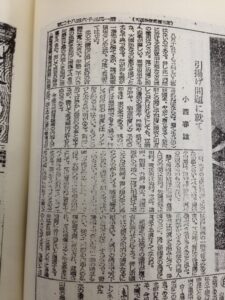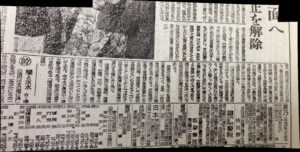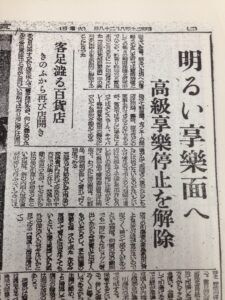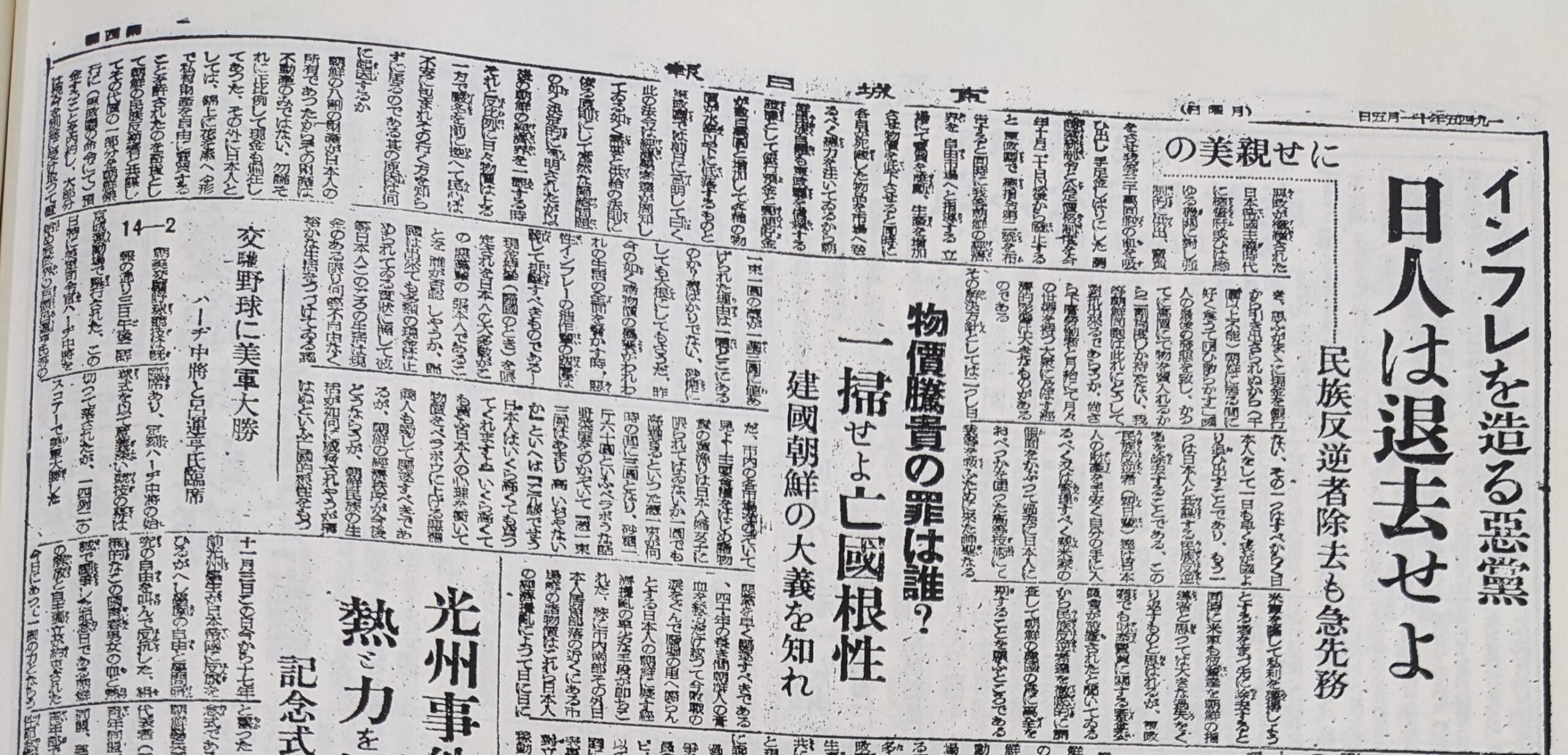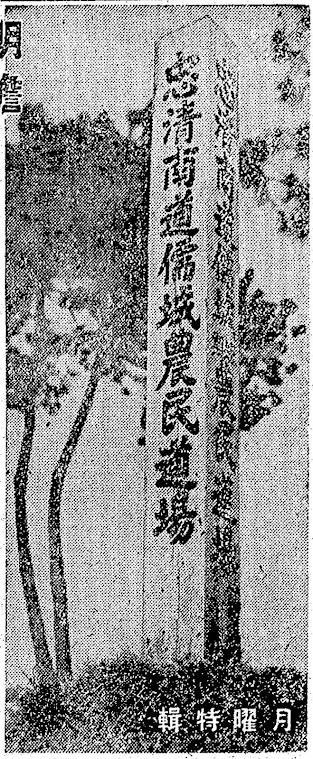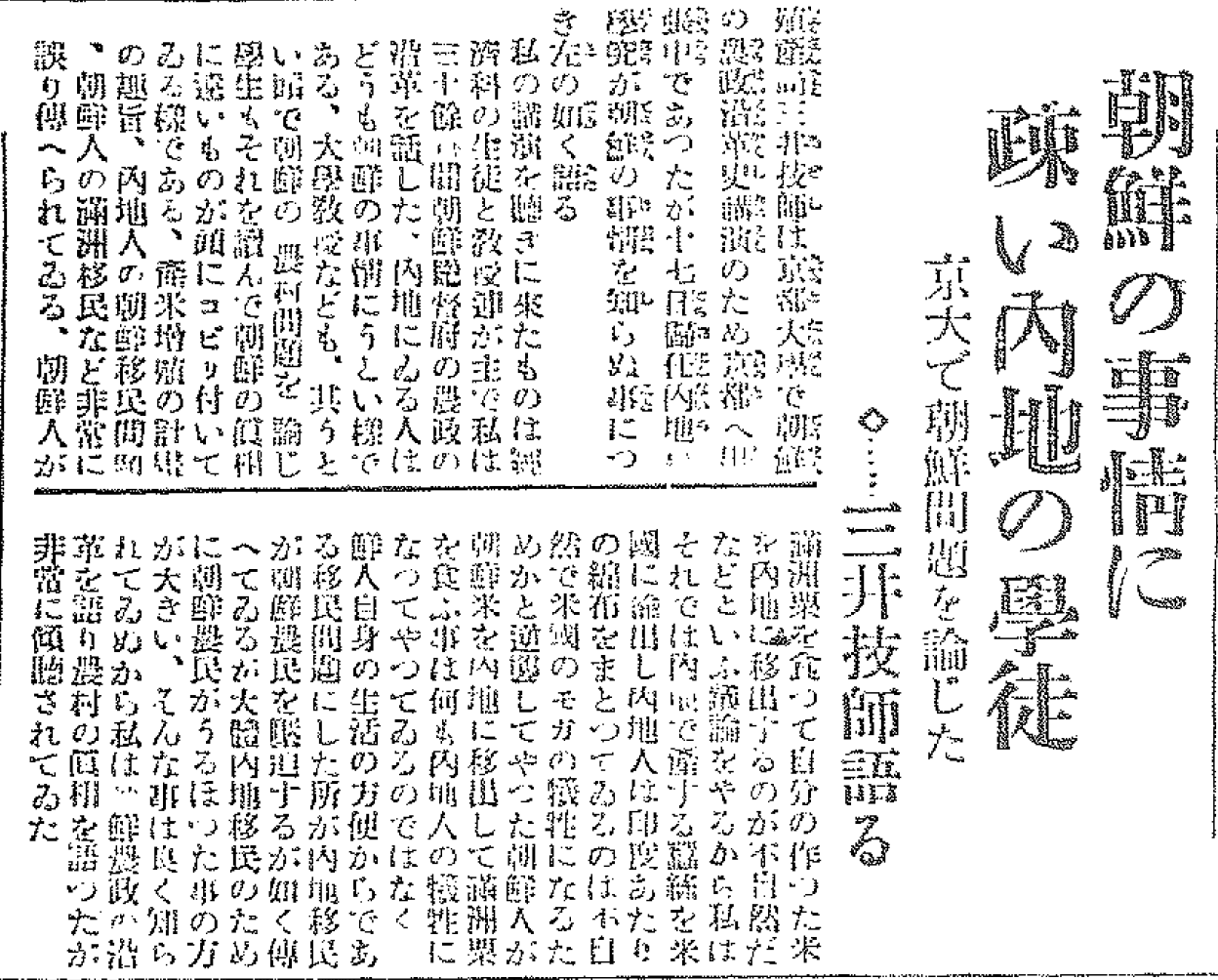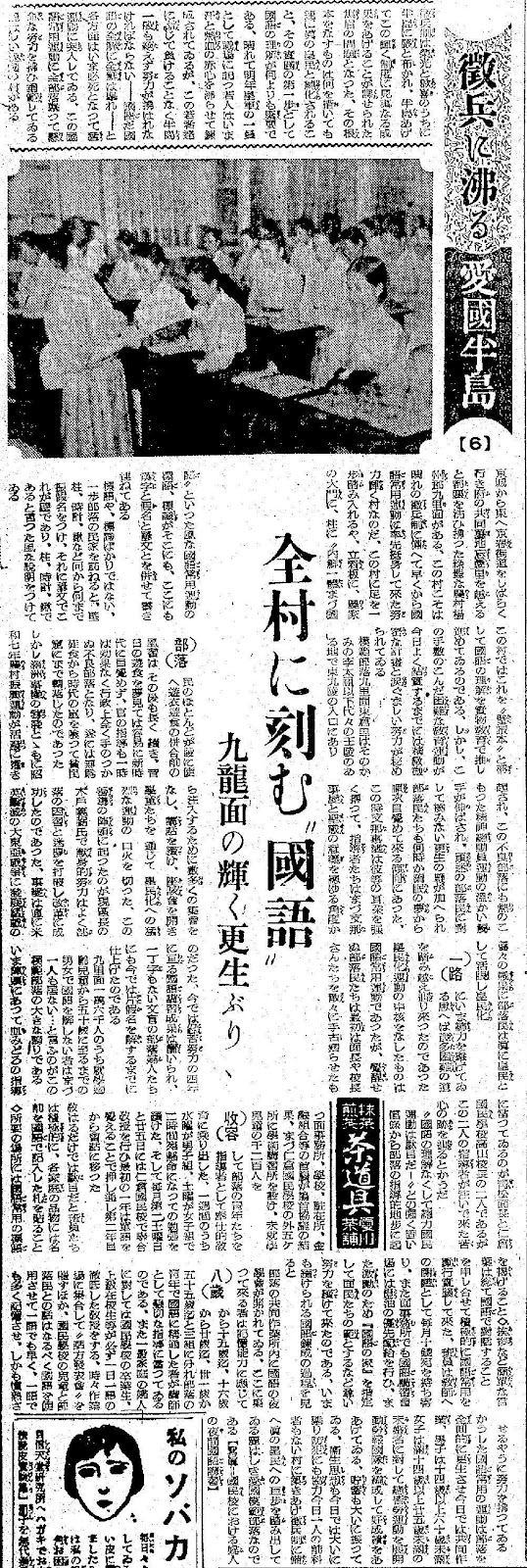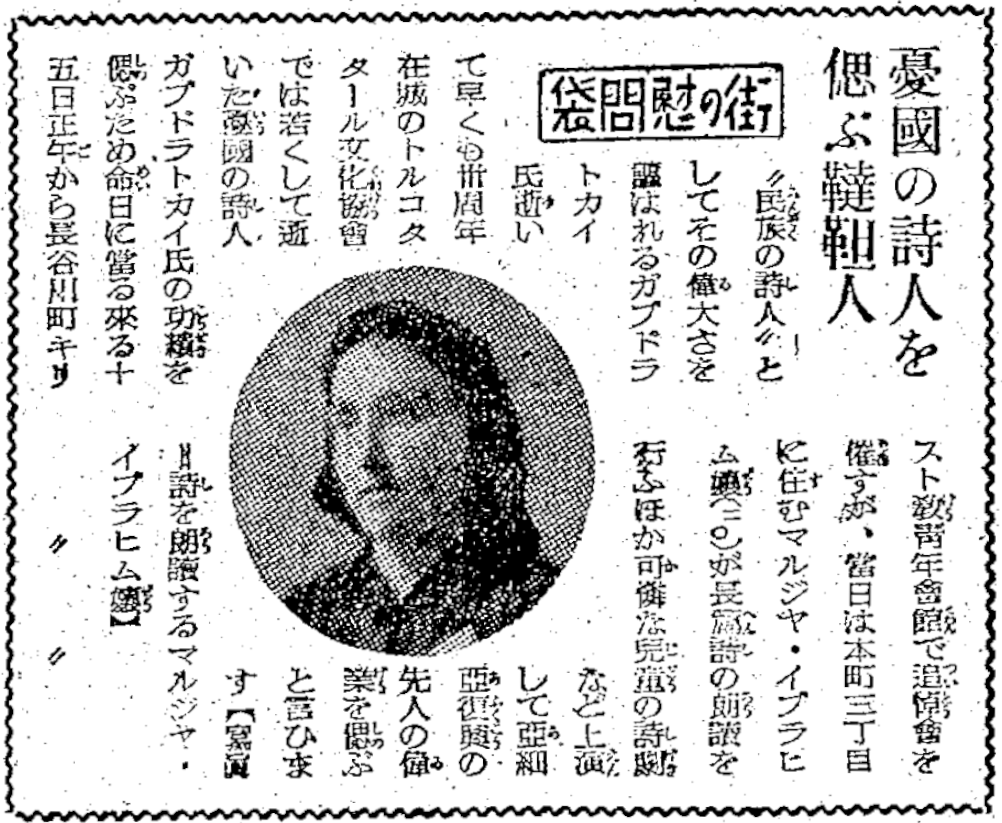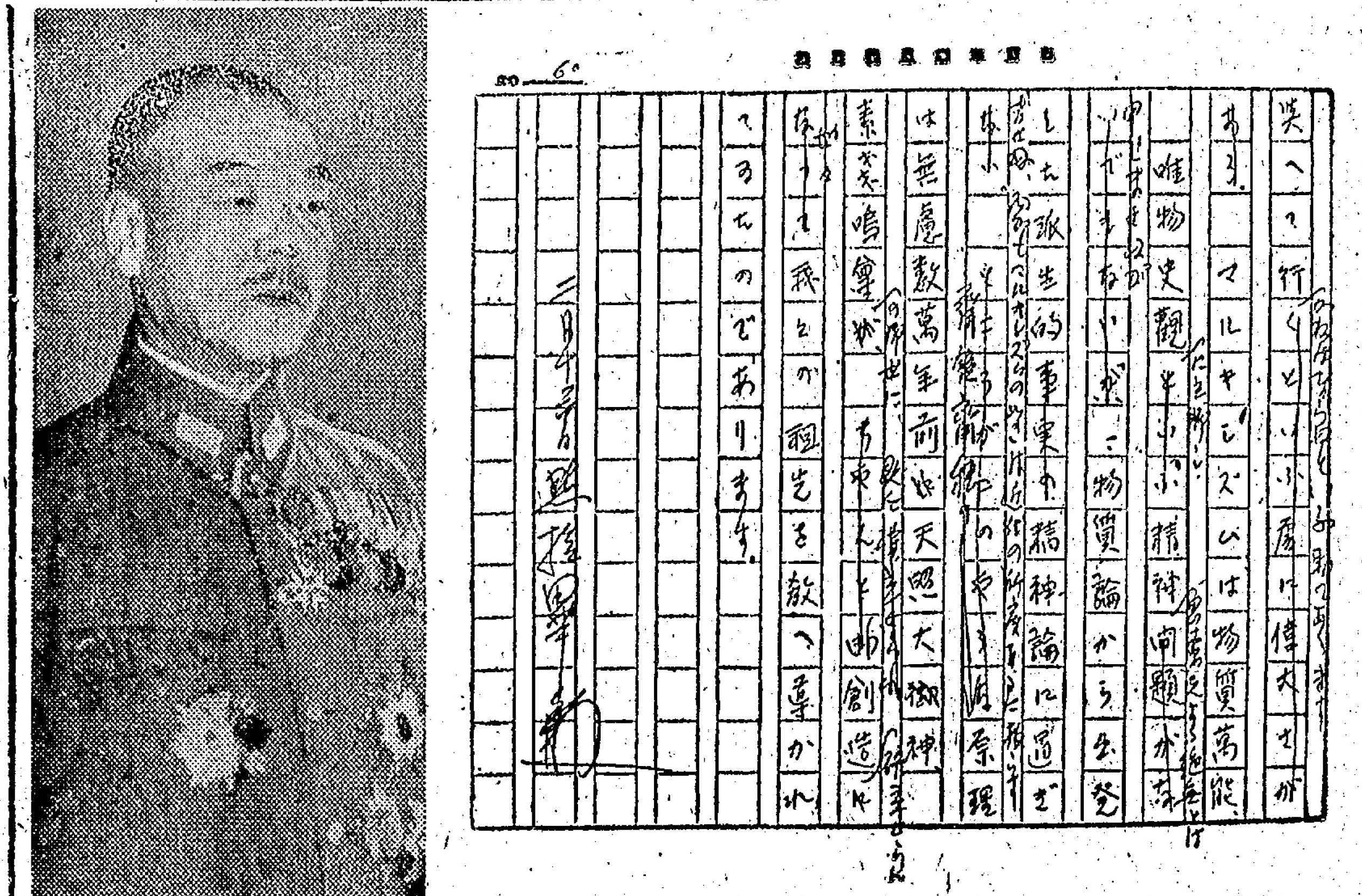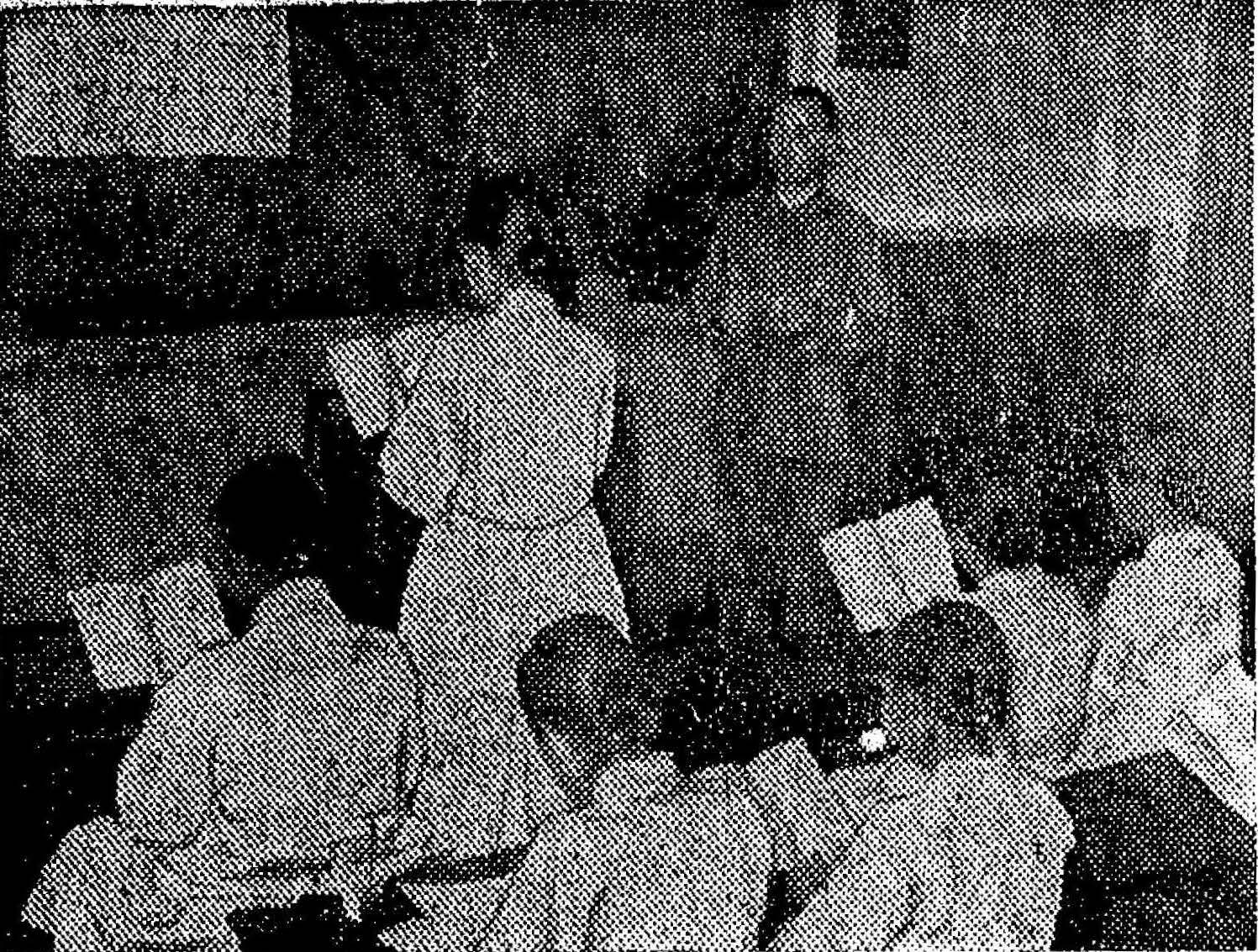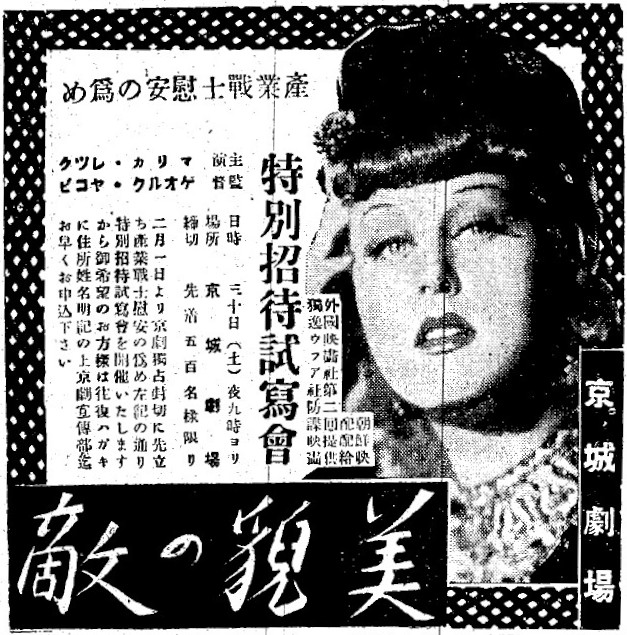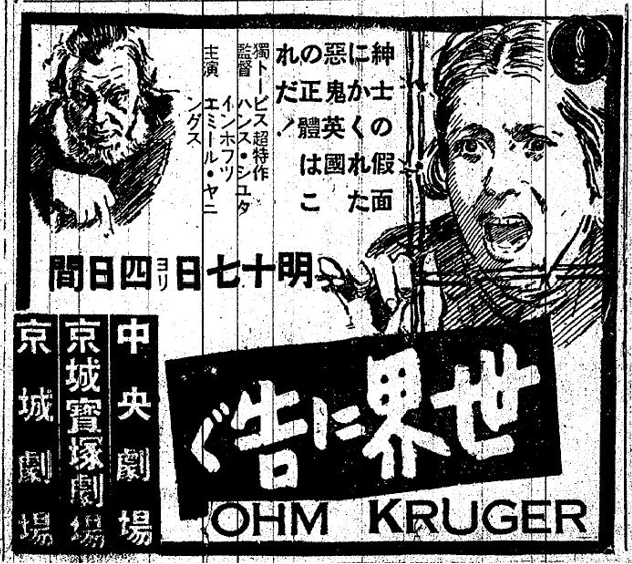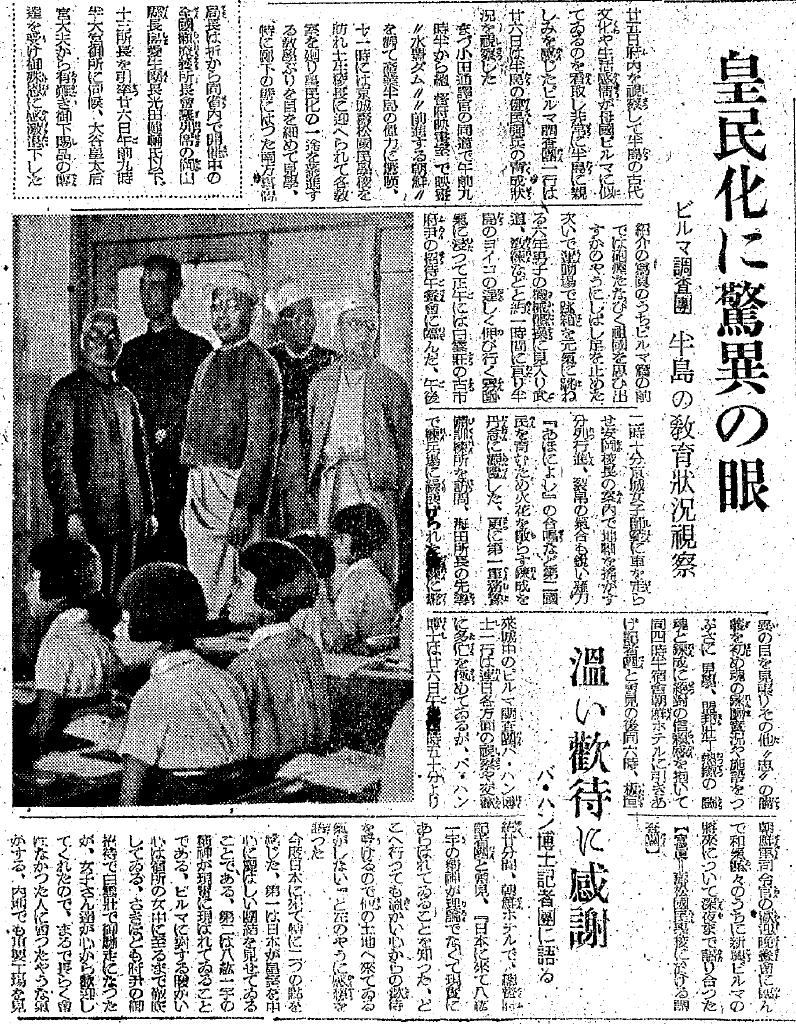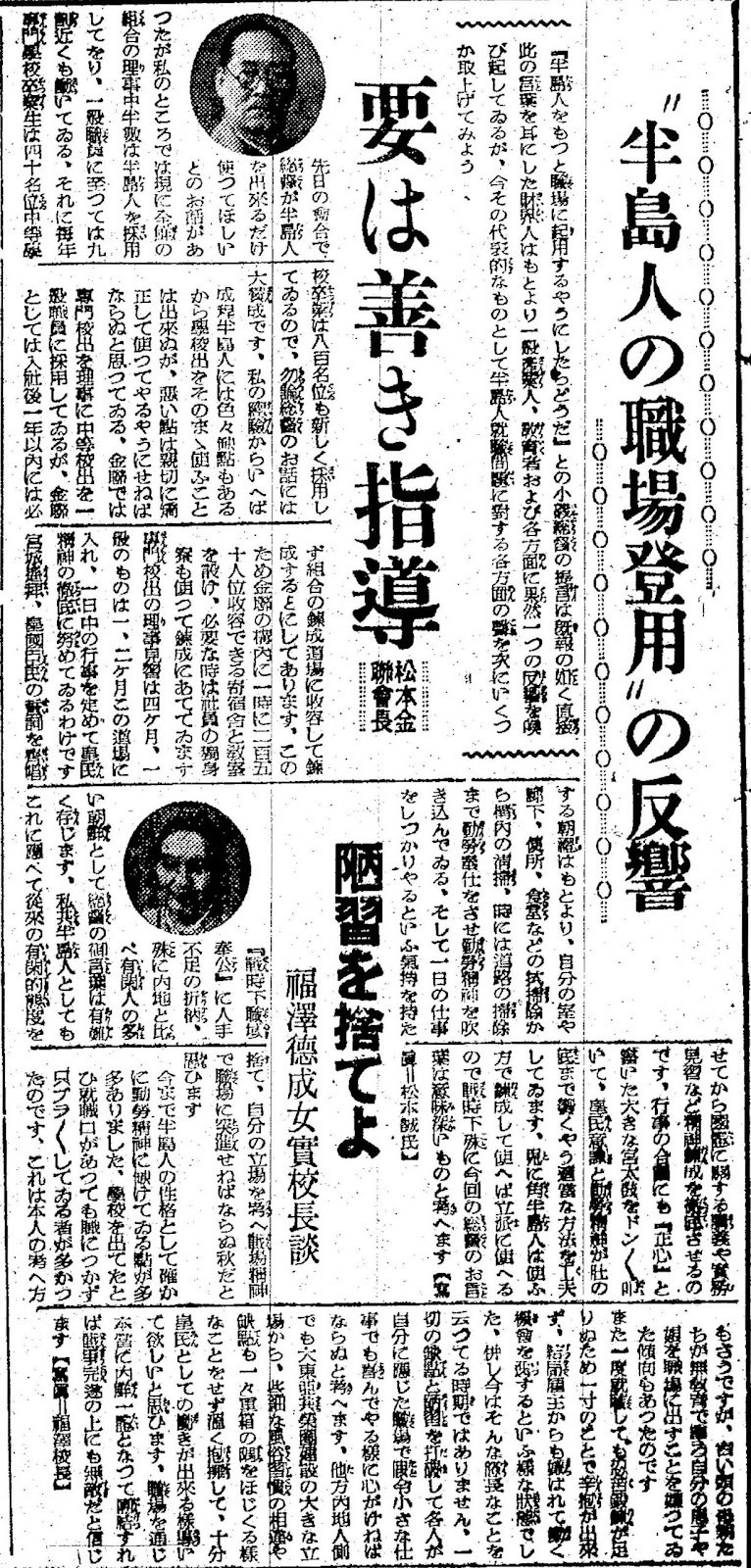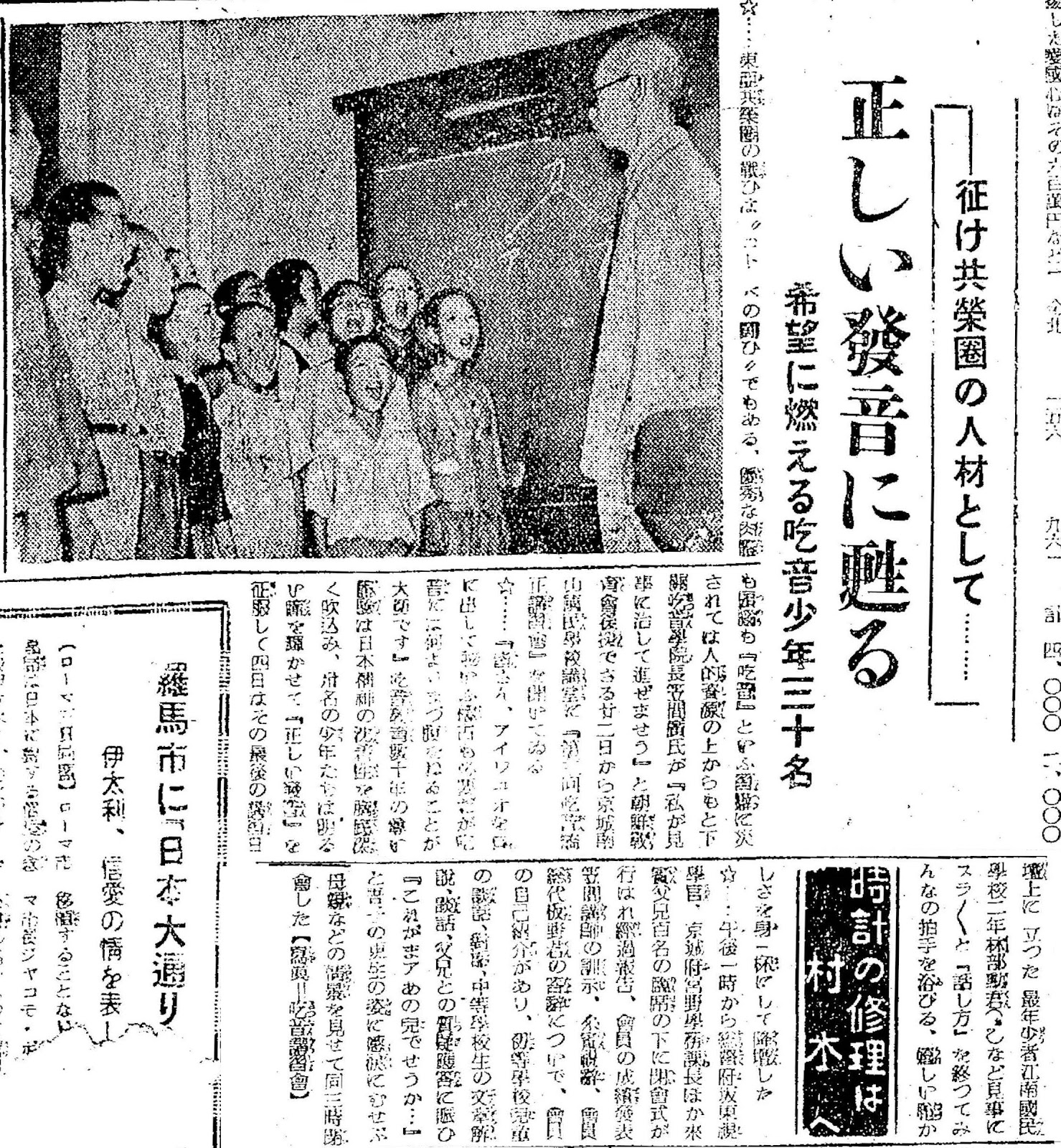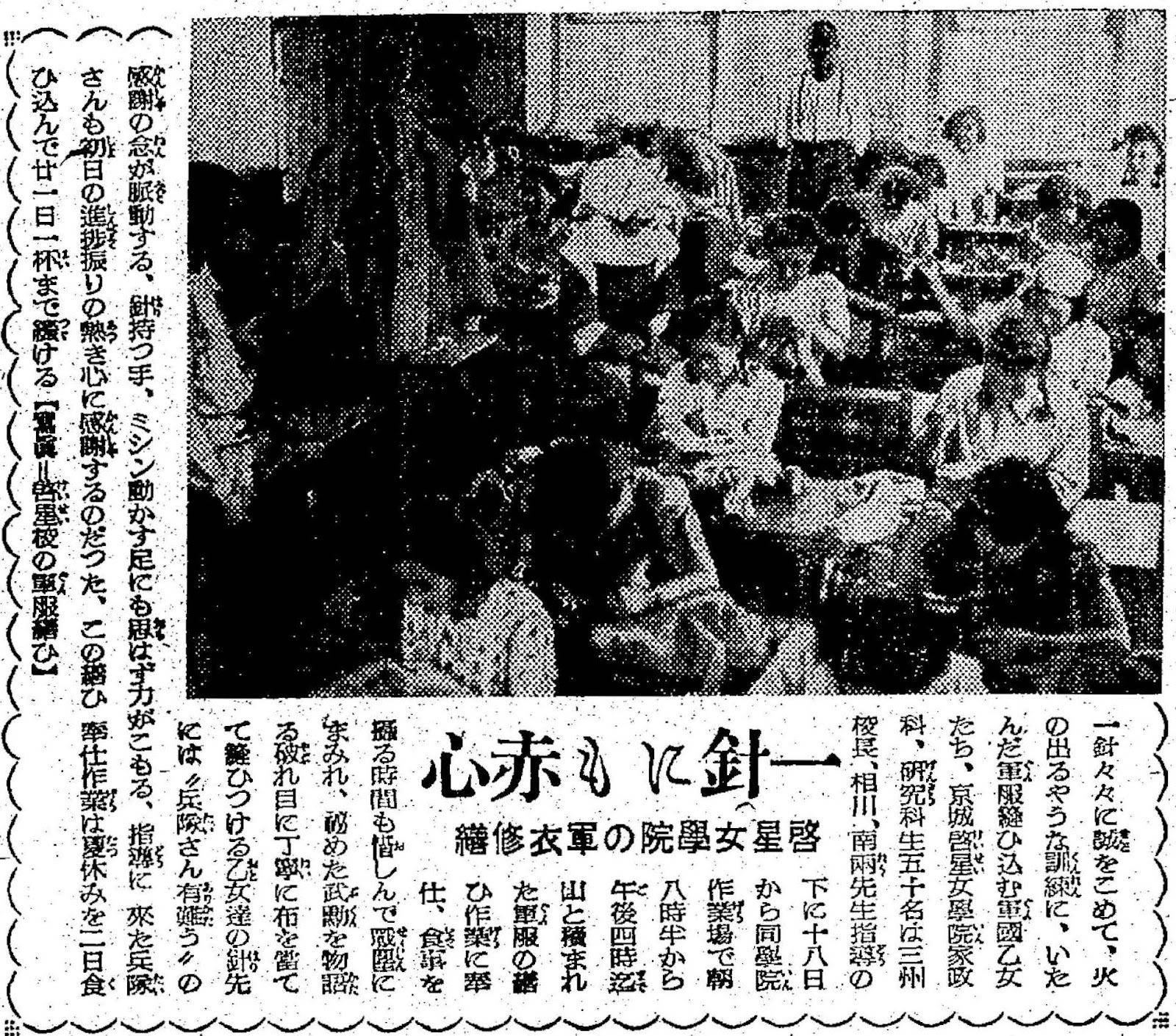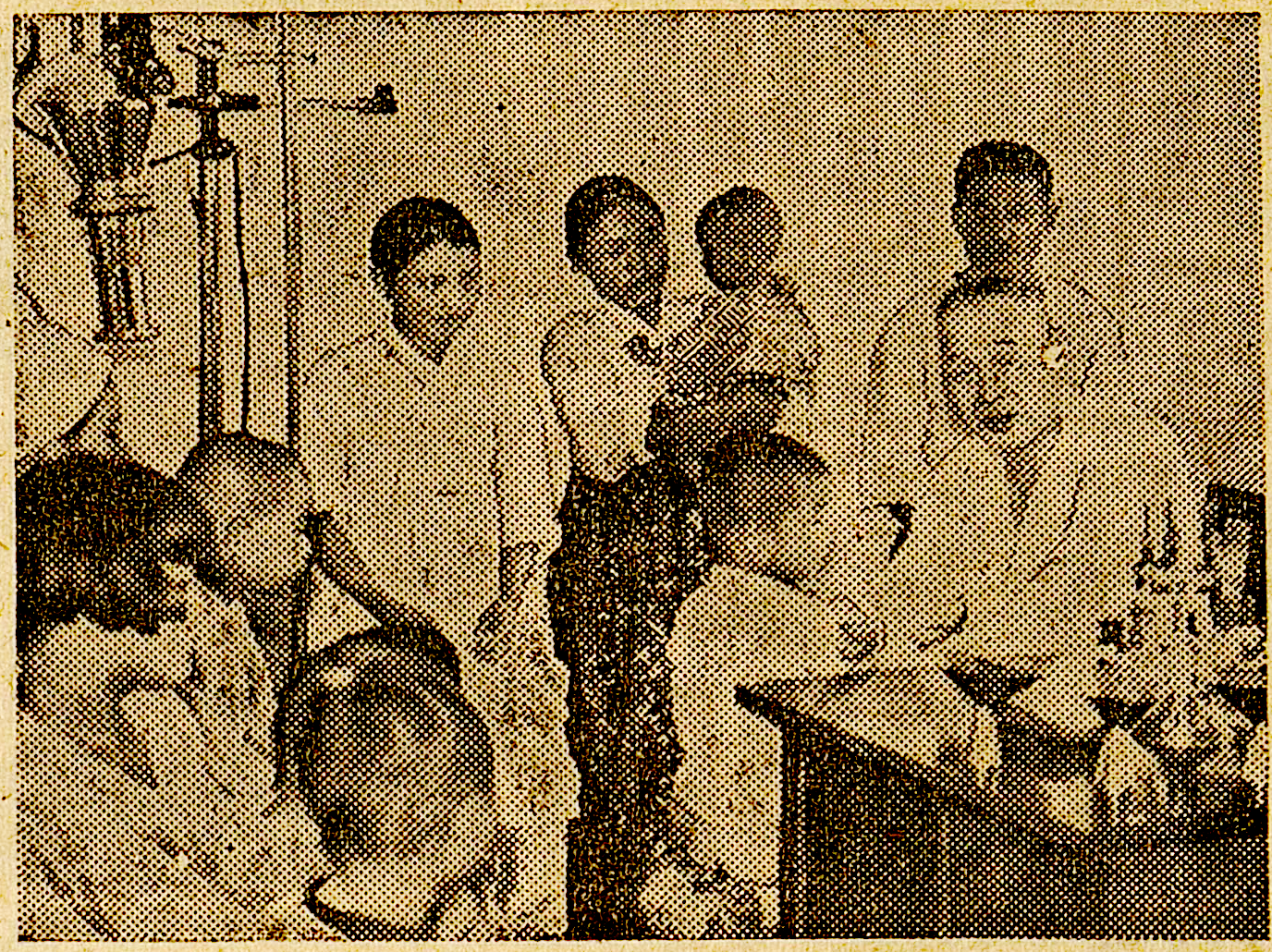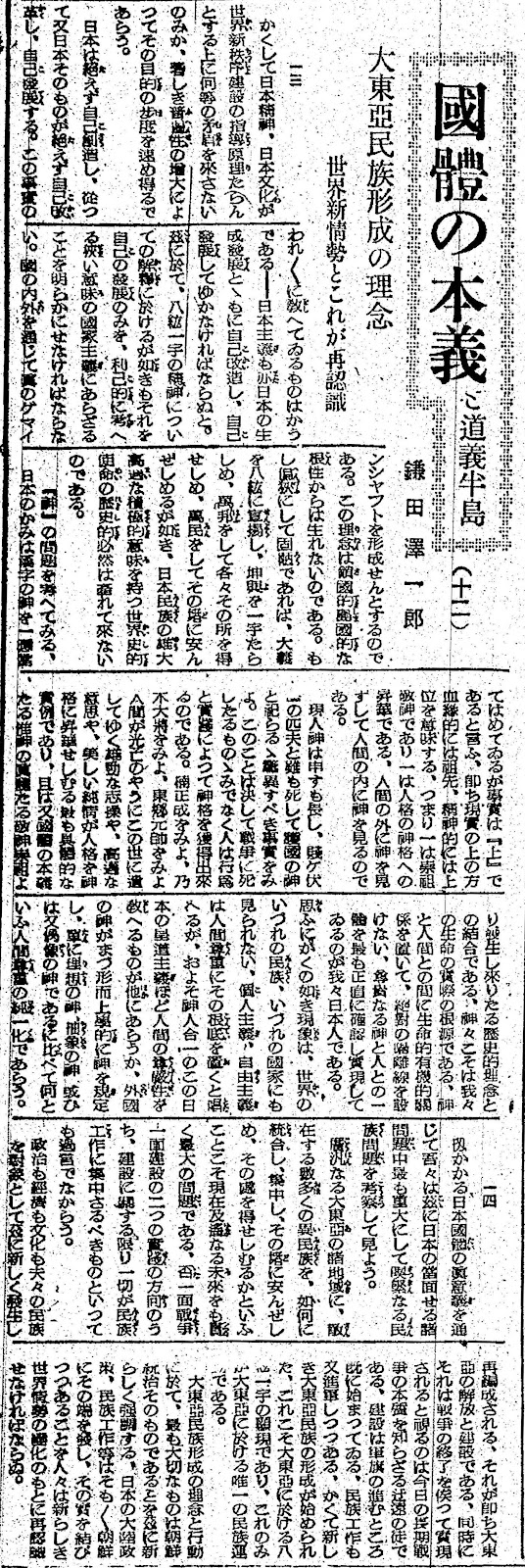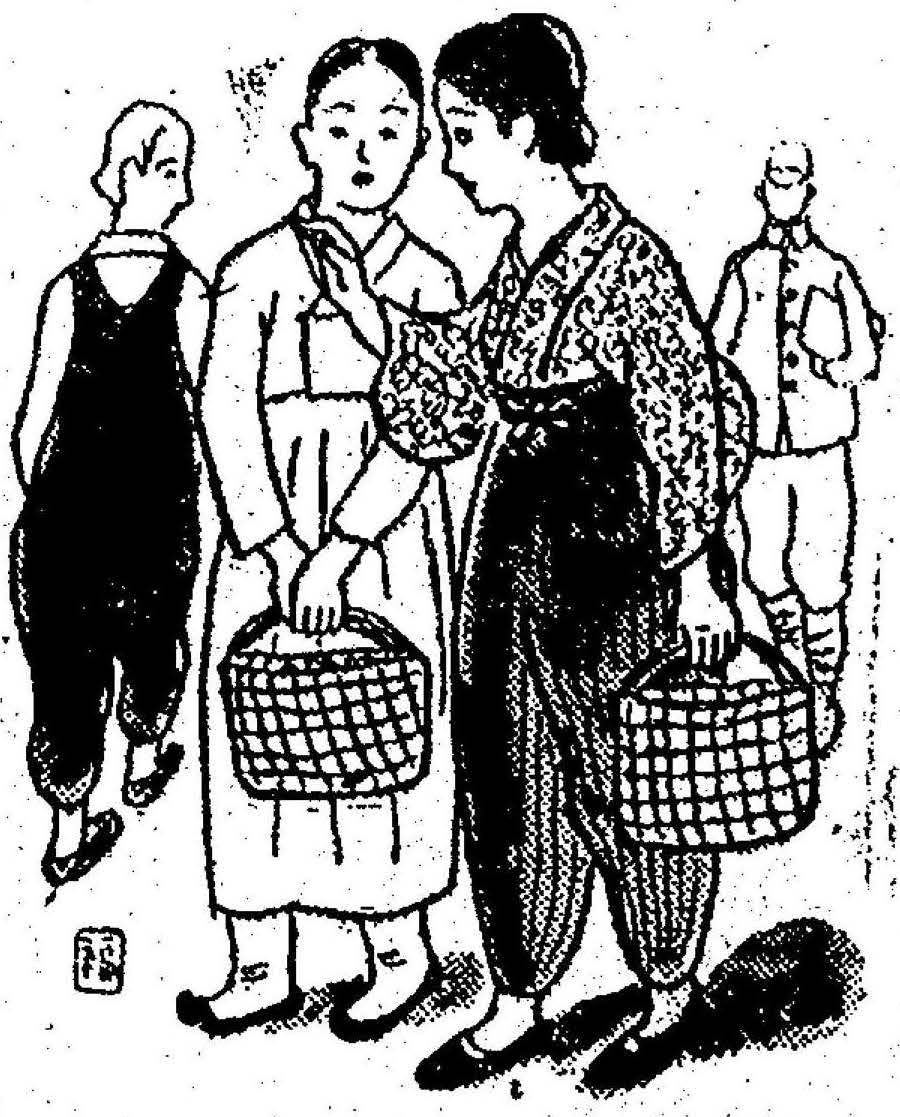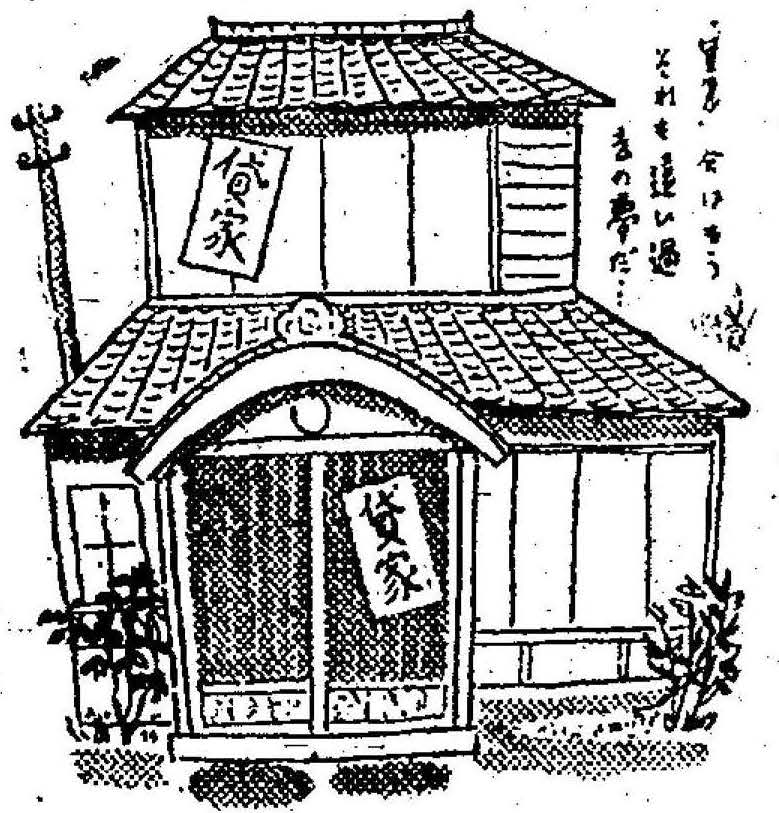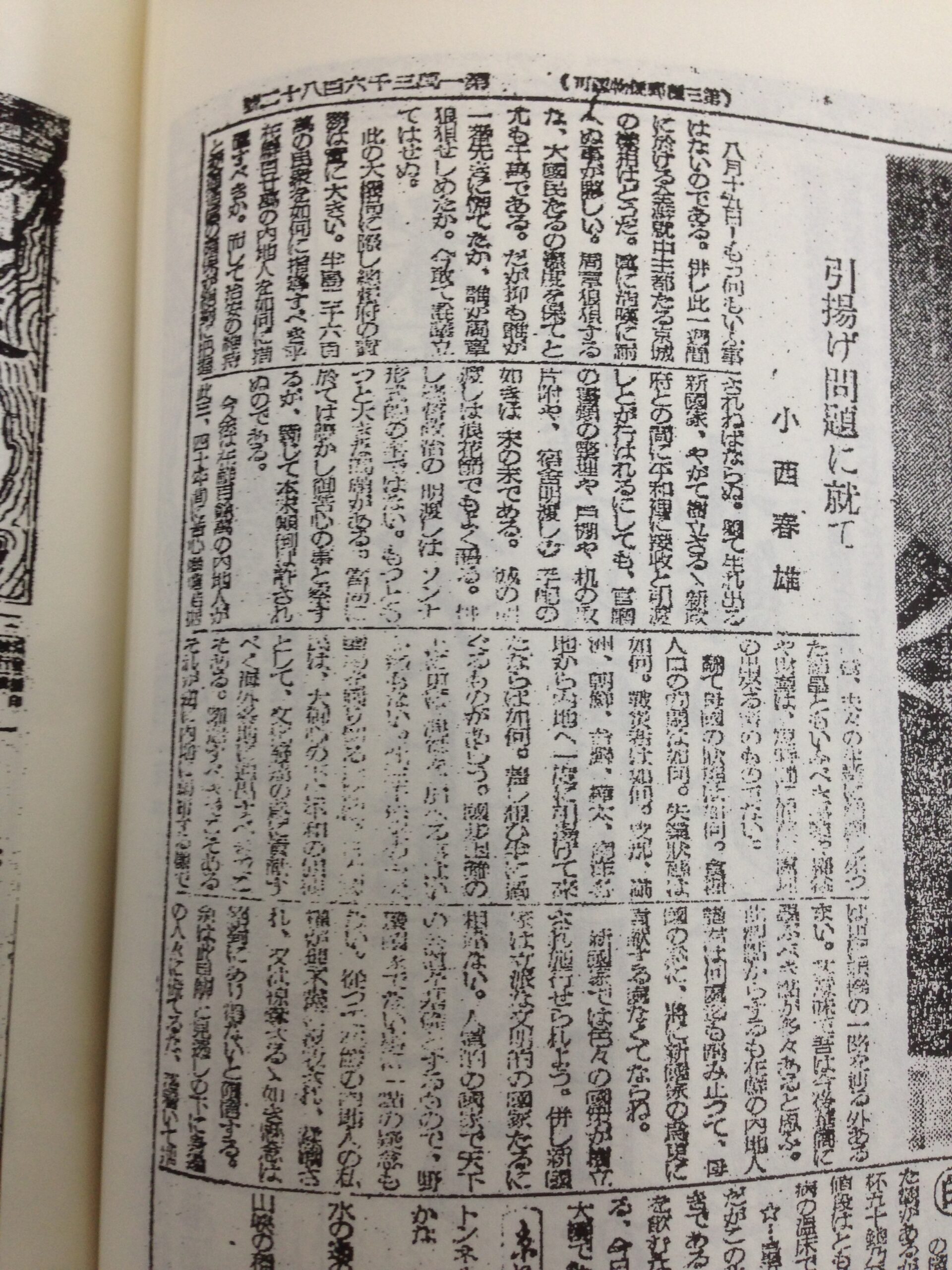
August 28, 1945: Colonial regime announces a peaceful transition of power to the new incoming Korean government, reopens comfort women services, department stores, cafés in Seoul as popular uprising subsides, plans orderly repatriation of Japanese residents
2023-12-06
428
1640
This is another fascinating historical article that I stumbled upon during my visit to the National Library of Korea a few months ago. This is a news announcement made on August 28, 1945 announcing an orderly, peaceful transition of power just 13 days after Imperial Japan surrendered on August 15, 1945. In the initial few days after August 15th, the military authorities were at the forefront making defiant announcements in the face of a massive Korean popular uprising, but for the first time since Imperial Japan’s surrender, a civilian leader, Mr. Konishi Haruo, has come forward to address the nation in a sober, conciliatory address emptied of the usual Imperialist bravado, to provide a blueprint for a peaceful transition of power to the new Korean state and the repatriation of Japanese residents back to Japan.
Mr. Konishi was a 66-year-old mining executive at Meiji Mining who came from a respectable Samurai family in Fukuoka prefecture. He had a distinguished career at various banks, treasuries, and chambers of commerce in Korea and Manchuria. There had always been tensions between civilian and military authorities in colonial Korea, but it seems that, in this moment, the military people have retreated into the background and the civilian leaders like Mr. Konishi have gained the upper hand.
Konishi calls upon Japanese residents in Korea to act responsibly, contributing positively to both their homeland and the new independent Korean state. He is confident that the rights of Japanese residents will be respected in a new humanitarian and civilized Korean state. He also touches on the practicalities of repatriation, like the handling of properties and belongings by trust companies and warehouses, and the limitations of transport capacity for returning all Japanese residents within the year. Konishi concludes by emphasizing the achievements of Japanese governance in Korea, such as infrastructure and financial systems, and expresses hope for a respectful and responsible transition period.
In the usual fashion, the editors at Keijo Nippo places positive, upbeat news articles adjacent to dark, serious news articles. This time, the ‘positive’ articles are about the reopening of ‘high-end entertainment establishments’ like restaurants, cafes, and comfort women services (kisaeng). This may have been a goodwill gesture by the colonial authorities to appease the angry populace and relieve social tensions ahead of the peaceful handover of power. For days after August 15, the civil unrest was apparently so intense that shops couldn’t open, but by August 27, the unrest had died down enough for shops to cautiously reopen, but there were still apparently not many shoppers who dared to ventured out to go shopping.
Note: These were challenging articles to decipher because of the poor state of preservation of the newsprint. There was a small section of the text that I just couldn’t make out, so I indicated this with ellipses. Sorry that I forgot to take a picture of the accompanying grainy news photo of shoppers gathered around a stall in a department store.
[Translation]
Gyeongseong (Keijo Nippo) August 28, 1945
On the Issue of Repatriation
By Haruo Konishi
August 15th. What is more to say about that day? However, what has been the state of Seoul, the capital of all Korea, in this past week? There are countless things that are truly lamentable. Do not panic! It is extremely important for us, as citizens of a great nation, to maintain our composure. But who were the very first ones to panic? Who were the ones to cause this chaos? Now is not the time to delve into that.
In this grave crisis, the responsibilities of the Governor-General’s office are indeed significant. How should they guide the 26 million people of the Korean peninsula? What should be done about the 1.2 million mainland Japanese residents in Korea? Maintaining public order and securing transportation and communication are absolutely crucial. Even if the transfer of power to the newly emerging state and its new government occurs peacefully, things like sorting office documents, clearing desks and shelves, and arranging for the handing over of lodgings are of least importance. The transfer of the city is often talked about in dramatic tales, but the transfer of the Governor-General’s rule is not just a matter of formality. There are much bigger issues at hand. I understand that the authorities are making great efforts, but they must not get things backwards.
In the future, it won’t be easy to simply dispose of the businesses, homes, and properties that over 1.2 million mainland Japanese residents in Korea have painstakingly developed over the past three to four decades.
On the other hand, what is the situation in our motherland? What about the food and population problem? The unemployment situation? The war victims? What if people from China, Manchuria, Korea, Taiwan, Sakhalin, and the South Pacific all repatriate to mainland Japan at once? There would likely be unimaginable difficulties. In addition to the country’s existing hardships…
…the Japanese people were supposed to, under the grand vision of the Emperor, play a key role in peace and contribute to cultural development by expanding overseas. But what should have been a matter of concern was if this, instead, led back to domestic repercussions, inevitably leading to a path of further misery.
In this sense, I believe there are many points we need to learn and adopt broadly. From this perspective, the mainland Japanese residents in Korea should hold their ground to the utmost extent, contributing not only to our motherland but also to the newly emerging state.
Various national policies will be established and implemented in the new state. However, the new state will undoubtedly be a civilized and humanitarian one, adhering to international standards of humanity, and not a barbaric state. Therefore, I firmly believe that there is absolutely no concern that the private rights of mainland Japanese residents in Korea will be unreasonably confiscated, trampled upon, or plundered. With this understanding and insight, I have been advising people around me not to panic, but to calmly observe and handle the transition. A few days ago, I read former Seoul University Professor Yasuda’s opinion in the Keijo Nippo newspaper and largely agreed with him, but I hope those in power will guide the people well. The Japanese people of Northern Korea repatriated in a state of confusion because Northern Korea became a battleground due to the Soviet Union’s offensive. This is completely different from the situation of the Japanese people in Seoul repatriating to mainland Japan.
The real estate properties of the repatriating people will be taken care of by a certain trust company, and their belongings will be stored in a certain warehouse. This is indeed commendable. However, this sounds to the people like they are being forced to hurry and repatriate. With this view in mind, they should be guided to stay and devote themselves to their livelihoods, showing great ambition and spirit, as it will likely be impossible to complete all repatriations within this year with the current transportation capacity.
Even if the Governor-General’s office is abolished, its residual duties must be managed, and some of them will likely be inherited by a future embassy or legation. It goes without saying that financial institutions and transportation and communication facilities must hold their ground until the end, ensuring as smooth as possible a transition of power, not just leaving things to “fate”.
There were considerable achievements during the Governor-General’s rule in terms of roads, ports, electricity, transportation, water resources, finance, etc. A certain Korean scholar said that it probably would have taken more than 200 years for the Korean people alone to achieve this much. Now is the most crucial time. This autumn is the time for us all to exercise self-restraint. (The writer is the Managing Director of Meiji Mining)
Towards a Brighter, Leisure-Focused Society
Relaxation of Restrictions on High-End Leisure Activities
Aiming for a return to a brighter society and life, the government is currently studying the removal of various restrictions imposed as wartime measures. As an immediate step, the full-scale lifting of the ban on high-end leisure activities, which was part of the “Decisive Battle Emergency Measures” implemented in March last year and further extended for a year this March, has been decided. Consequently, not only the opening of restaurants and cafés but also the employment of female entertainers and kisaeng is now permitted. Furthermore, authorities are also advancing their research on potentially freeing up special leisure sectors such as dance halls and cabarets depending on the situation.
Department Stores Struggle with Decline in Customer Foot Traffic
Reopening Since Yesterday
Since that day, various department stores had been completely closed, but they reopened their doors from August 27th. However, due to a lack of merchandise, the situation is such that, conversely, black markets have emerged in the city offering almost everything at high prices. Consequently, domestic department stores like Mitsukoshi, Chōjiya, and Minakai had fewer customers than expected on their long-awaited reopening, especially in food and textile sections which remained quiet. Only a few Western goods, cosmetics, and general merchandise were being sold to some extent.
Mitsukoshi, for instance, had been holding a swap meet for unnecessary items since the beginning of the month, which was suspended on August 16th, and exchanges were halted. But from August 27th, the retrieval of items resumed. As for the purchases of furniture and household goods of repatriating people by various department stores, which are reportedly to be organized by a certain mainland Japanese welfare association, there is no official word yet, so people are slowly bringing in items.
According to observations from various stores, there might be fewer items for sale now since so many were sold off at once previously, and the situation in the surrounding areas has somewhat stabilized, suggesting that there may not be a need to rush into selling. This could be why there are surprisingly few items up for sale. [Photo = At a certain department store]
[Transcription]
京城日報 1945年8月28日
引き揚げ問題に就いて
小西春雄
八月十五日。もう何もいう事はないのである。併し此一週間に於ける全鮮就中主都たる京城の様相はどうだ。真に浩嘆に耐えぬ事が夥しい。周章狼狽するな。大国民たるの襟度を保てと尤も千万である。だが抑も誰が一番先きに慌てたか。誰が周章狼狽せしめたか。今敢えて詮議立てはせぬ。
此の大難局に際し総督府の責務は実に大きい。半島二千六百万の民衆を如何に指導すべき乎、在鮮百二十万の内地人を如何に措置すべきか。而して治安の維持と交通通信の確保が絶対に把握されねばならぬ。軈て生れ出る新国家。やがて樹立さるる新政府との間に平和裡に接収と引き渡しとが行われるにしても、官庁の書類の整理や戸棚や机の取片付けや、宿舎明け渡しの手配の如きは末の末である。城の引き渡しは浪花節でもよく語る。併し総督政治の明け渡しは、ソンナ形式的の事ではない。もっともっと大きな問題がある。当局に於いては嘸かし御苦心の事と察するが、断じて本来顛倒はゆるされぬのである。
今後は在鮮百余万の内地人が此三、四十年間に苦心惨憺を据えて、夫々の生業に従事し来った結晶ともいうべき事業や家産や財産は、短時間に簡単に処理の出来る筈のものでない。
翻って母国の状態は如何。食糧人口の問題は如何。失業状態は如何。戦災者は如何。支那、満州、朝鮮、台湾、樺太、南洋各地から内地へ一度に引き揚げて来たならば如何。蓋し想い半に過ぐるものがあろう。国歩困難の上に更に...
...国民は、大御心の下に平和の鍵役として文化発展の為に貢献すべく海外各地に進出すべきでこそある。憂惧すべきでこそあるそれが逆に内地に帰結する様ではさらに悲惨の一路を辿る外あるまい。
其の意味で吾は今後寛闊に学ぶべき点が多々あると思う。其の観点からするも在鮮の内地人諸君は何処迄も踏み止って、母国の為に、将に新国家の為更に貢献する處なくてならぬ。
新国家では色々の国策が樹立され施行せられよう。併し新国家は立派な文明的の国家たるに相違ない。人道的の国家で天下の人道を基準とするもので、野蛮国家でない事に一抹の疑念もない。従って在鮮の内地人の私権が理不尽に没収され、蹂躙され、又は掠奪さるる如き懸念は絶対にあり得ないと確信する。余は此見解と見透しの下に身辺の人々に慌てるな、落ち着いて推移を静観善処せよと説いて居る。数日前、元城大安田教授の御意見を京日紙上で拝見し大体に於いて同感したが、更に権力ある方々からよく民衆を指導して戴きたい。北鮮の人々が右往左往して引き揚げたのは、ソ聯の進攻で北鮮が戦場となったからで、京城人が内地へ引き揚げるのとは全然筋合いが違う。
引き揚げ者の不動産は某信託会社で世話する。又荷物は某倉庫で保管するという。誠に結構である。併し之等が民衆には引き揚げろ引き揚げろと響く。斯く斯くの見渡しであるから安心して踏止って生業に勤め、大器雄心を発揮せよと指導して行くげきであり、現在の輸送力でも今年一ぱいでは到底全部の引き揚げは不可能であろう。
総督府は撤廃となっても残務は処理さるべく、且つ其の一部は将来大使館なり公使館なりに継承されるであろう。金融機関や交通通信機関が最後迄踏み止るのは勿論、新国家をして其の昨日を困難ならしむることなく『あとは野となれ山となれ』ではなく出来るだけ円滑に政権の推移が遂行する様にありたい。
総督政治に於ける道路、港湾、電力、交通、水利、金融等々の治績は相当のものがある。或る半島の識者は、半島人のみの手では二百年かかっても之だけの事業は恐らく出来まいと洩らしていた。今やその最後の一番大事な時である。お互いに自重すべき秋である。(筆者は明治鉱業専務)
明るい享楽面へ
高級享楽停止を解除
明るい社会、明るい生活への復帰をめざし、本府では戦時措置としての種々の制限撤廃を研究中であるが、差し当たり昨年三月実施本年三月さらに一ヶ年延長された『決戦非常措置要綱』中の高級享楽停止を全面的に解除することになった。従って料理屋、カフェーの開店は勿論、芸妓、妓生などの就業も許可されるわけであるが、当局ではさらに場合によってはダンスホール、キャバレー等特殊享楽部面の解放についても研究を進めている。
客足渋る百貨店
きのうから再び店開き
あの日以来すっかり店を休んでいた各百貨店は二十七日から再び蓋を開けたが、何しろ商品のない折柄ではあり、逆に街には闇市場が出て高値さえ承知ならこちらには殆どないものがないという有様なので中止の内地側百貨店は三越も丁子屋も三中井も久し振りの開店の割には客が少なく、特に食料品や繊維製品売場は閑散で、わずかに洋品雑貨、化粧品、荒物類が淋しく売れていく程度である。
三越など月初めから不用品の交換会が行われていたのが十六日で休業となり、交換も中断の形だったが、二十七日からは出品の引き取りが始まったという程度。例の内地人世話会が肝煎りで行うという各百貨店での引揚者の家具家財の買上も正式の話がまだないので、ぼつぼつ持って来る人があるという程度。
何処の店の観測でも一時にあんなにドッと売出したから今更売りに出す人も少ないだろうし、まだ四囲の情勢も落ちついて来たため、更慌てて売りに出さなくてもいいという様な見透しから案外出品は少ないのじゃないかと見ている。【写真=某百貨店にて】
